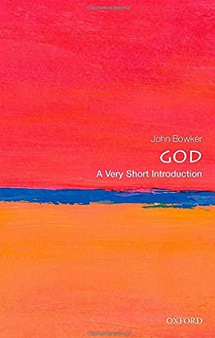GOD: A Very Short Introduction
A priest with missionary heart emerges from the professional theologian in this concise book about God
 GOD: A Very Short Introduction
GOD: A Very Short Introduction
By John Bowker
Oxford
ISBN 978-0-19-870895-7
Reviewer John Rackley
The Very Short Introductions (VSI) offer a concise and accessible way to consider a new subject. They are written by experts from the chosen area of interest and range from The British Constitution to Anarchism, Privacy to Robotics. They offer a starting point and then point on to the paths ahead.
In his VSI John Bowker achieves just this. He is an authoritative theologian, translator and author working both in Britain and the USA. Due to failing eyesight he acknowledges the help of his wife in completing the script. She is an ecclesiastical historian and together they have served the Anglican Church worldwide.
Whether or not this makes them experts on God I would expect them to deny but they are clearly well-placed to reflect on how people have described the experience and comprehension of ‘the magnificent concept of God which will not go away’.
The book has a simple structure.There are chapters on what are called the religions of Abraham; the Jewish, Christian and Muslim understandings of God and a further chapter on the Religions of India.They are introduced by chapters that ask the questions: Does God exist and why believe in God? They provide a very helpful overview of the current state of these two perennial questions with comprehensive references and suggestions for further reading.
The final chapter is the ways people have claimed to know God. Bowker uses the image of clothing the invisibility of God and suggests three types of clothing; they are the glories of creation, the inspiration of human achievement and incarnations of the Spirit flesh. He concludes humbly and hopefully:
God is invitation, and that invitation is extended to all. If we wish to take it up, how do we do so? We begin with prayer. It starts in extreme simplicity: we come simply and deliberately before God, into the awareness of God and declare ’You made me and You sustain me. This breath and this moment is Your gift. You know me. Help me to know You’.
And so a priest with missionary heart emerges from the professional theologian. But who might read this book?
I notice that among the acknowledgements is the VIth Form of St John’s School Leatherhead. So a minister may want to offer this to a thoughtful teenager who wants to know where the Christian understanding of God stands up to the ways of other Faiths or point it out to a church member who is drawn to the role of philosophy in the formation of faith.
This may sound too far away from what passes for discipleship development in our churches. But one of the more interesting sections in this book is a brief synopsis of neuroscience and experience. Bowker wrote about this relationship in his book The Sacred Neuron where he considers the connection between the working of the human mind and how certain ideas are processed into beliefs. He concluded that rationality and faith are complementary and that faith and belief are rooted in reason and quotes from Why God won’t go away
As long as our brains are arranged the way they are, as long as our minds are capable of sensing this deeper reality, spirituality will continue to shape the human experience, and God, however we define that majestic, mysterious concept, will not go away.
This leave me wondering whether teachers of the faith, like ministers and elders need to re-introduce the call of Jesus to love God with our mind, which was itself an insertion by our Lord into what he was quoting from the Old Testament.
Have we over-stressed feeling over thoughtfulness in the way we have encouraged enquirers and church members to encounter God? Has the use of intuition and imagination shouldered out the discoveries that can be received through analysis and reason?
As the Authorised version translation of 1 Corinthians 14:20 declares ‘in your understanding be men’. Of course we may wish to substitute ‘mature’ for ‘men’ but let’s not overlook the first part of that exhortation.
I wonder, for lack of that encouragement many who would come to God and know him through their rational side have turned away from our churches.
Other VSI about the Christian Faith include
THE BIBLE John Riches
THE REFORMATION Peter Marshall
THE NEW TESTAMENT Luke Timothy Johnson
JESUS Richard Bauckham
Baptist Times, 07/08/2015